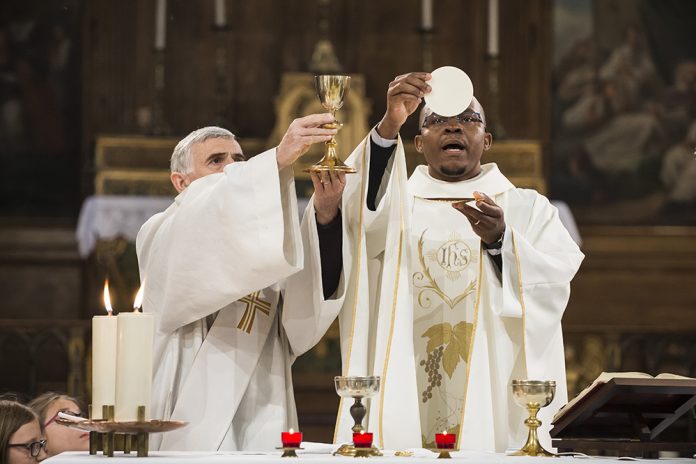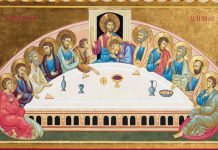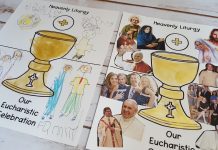
By Father Thiago Ibiapina
associate pastor, Annunciation Parish, Gardner
Special to The Catholic Free Press
This weekend we celebrate the Solemnity of the Body and Blood of Christ, often called Corpus Christi. On this feast we give special attention to Christ’s presence in the Eucharist, sometimes adding outdoor eucharistic processions at the end of Mass. (See Around the Diocese calendar on Page 8.) Last year on this feast day, the Catholic Church in the United States began its three-year National Eucharistic Revival.
The Eucharist should always be central to our lives; it is the “source and summit” of life in the Church. Mass is offered every day of the year (except Good Friday, when a liturgy with Scripture readings and distribution of Communion is held instead). Catholics are obliged to attend Mass weekly and are encouraged to attend more often.
From Scripture we learn about setting aside a day each week specifically to worship God: “Remember to keep holy the sabbath day. Six days you may labor … but the seventh day is the sabbath of the Lord.” (Ex 20:8-10)
Genesis 2:3 explains why: “God blessed the seventh day and made it holy, because on it he rested from all the work he had done in creation.” In Hebrew, sabbath refers to rest. Observing this day gave the Jewish people a regular rhythm of life, with traditions that emphasized abstinence from work and physical activities.
Christians inherited from the Jews this interrupting of secular activities to give a day entirely to God. The Westminster Confession of Faith (initially published in 1646), which has influenced our brothers and sisters in some other Christian traditions, says that God specifically designated one day in seven to be a sabbath, which he sanctified. From the beginning of the world until Christ’s resurrection, that day was the last of the week. From the Resurrection onward, it was changed to the first day of the week, a day called the Lord’s Day.
In the Old Testament, the people of God kept the sabbath on the last day of the week because of the work of creation. From New Testament times to our own day, Christians observe the first day of the week because of the work of redemption; when Jesus completed his work of salvation, rising from the dead on Sunday, he rested from that work. Thus, on Sunday, we Christians can celebrate God the creator and sustainer, and God the Savior, who has given himself for us.
A description of how early Christians celebrated this day comes to us from an account by St. Justin Martyr in about 155 A.D.: On the day of the sun, all those of us who live in cities or fields gather in the same place. … When the prayer is finished, bread, wine, and water are brought. We all meet on the day of the sun because it is the first day, the day on which God transformed the darkness and matter to create the world, and because Jesus Christ the Savior rose from the dead that very day.
The Catechism of the Catholic Church, speaking about the early Christians, quotes Acts 2:42: “They devoted themselves to the apostles’ teaching and fellowship, to the breaking of bread and the prayers. … Day by day, attending the temple together and breaking bread in their homes, they partook of food with glad and generous hearts.” (#1342)
The Catechism continues: “It was above all on ‘the first day of the week,’ Sunday, the day of Jesus’ resurrection, that the Christians met ‘to break bread.’ From that time on down to our own day the celebration of the Eucharist has been continued so that today we encounter it everywhere in the Church with the same fundamental structure. It remains the center of the Church’s life.” (#1343)
From this tradition, the Catechism specifies how Catholics are to participate in the celebration: “The Church obliges the faithful ‘to take part in the Divine Liturgy on Sundays and feast days’ and, prepared by the sacrament of reconciliation, to receive the Eucharist at least once a year, if possible, during the Easter season. But the Church strongly encourages the faithful to receive the holy Eucharist on Sundays and feast days, or more often still, even daily.” (#1389)
To fulfill this obligation, Catholics can attend the Lord’s Day Mass on Saturday evening. Attending weekday Masses is an extra blessing; it does not fulfill the Sunday obligation.
So, the sabbath on the seventh day has not been canceled, but transferred to the first day of the week. The day changes; the principle does not. We work six days; we rest one day. Not just any day we choose, but one that reminds us of the salvation Christ has achieved for us. Therefore, it is a day not just of worship and rest, but also one of sanctification and hope.
Let us go rejoicing to the house of the Lord – this Sunday and every Sunday, and any other day we can.
This article originally appeared in The Catholic Free Press and is reprinted here with permission.




